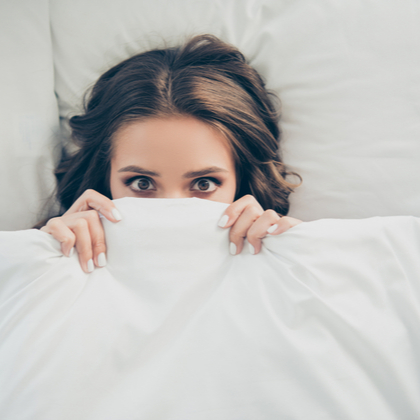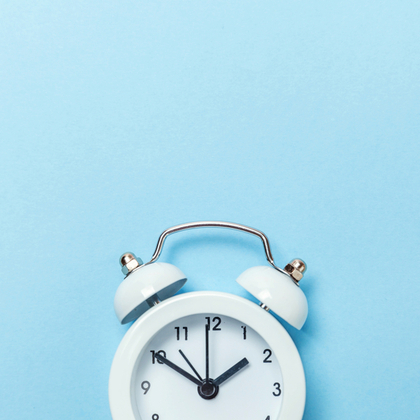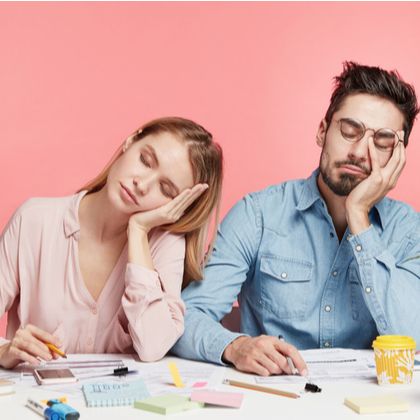
In the UK, we drink around 98 million cups of coffee daily (1). Many of us can’t start the day without it. We know caffeine gives users a boost, but how do its energising properties impact sleep? We take a look below.
How does caffeine wake you up?
Caffeine stimulates the central nervous system, which makes you sharp and focused. It promotes alertness by inhibiting the sleep-inducing chemical adenosine (1).
Adenosine is critical for regulating the sleep-wake cycle. After you’ve been awake for several hours, adenosine starts to increase. The more adenosine, the sleepier you become. When caffeine disrupts this process, you remain vigilant and awake.
How does caffeine affect sleep?
Thanks to its adenosine-blocking qualities, caffeine has a reputation for extending sleep latency (the time it takes to fall asleep), reducing total sleep time, diminishing sleep efficiency, and worsening perceived sleep quality (2).
Caffeine can also reduce the amount of deep sleep you get. Deep sleep is vital for feeling recharged and refreshed the following morning (3).
If you struggle with insomnia, you may use caffeine as a crutch to fuel you throughout the day. However, this often worsens sleep hygiene and kickstarts an unhealthy vicious cycle of excessive caffeine consumption and sleep deprivation.
How long does caffeine last?
All drugs (yes, caffeine is considered a drug) have a half-life – the time it takes for its initial level of impact to reduce by 50 per cent.
Caffeine has a half-life of around six hours and a quarter-life of twelve hours (4). So, if you have an espresso in the middle of the afternoon, a quarter of it will still be in your system at midnight, which doesn’t bode well for sleep.
One study gave participants 400mg of caffeine 0, 3, or 6 hours before bed (5). The findings revealed that all caffeine consumption disrupted sleep in some capacity. Even at 6 hours, caffeine reduced sleep by more than 1 hour.
When in the day should you stop drinking caffeine?
If you think your sleep hygiene could be better, we recommend consuming all your caffeine before midday. That said, you don’t need to go overboard in the morning. As with everything, caffeine consumption should be balanced and healthy.
How much caffeine is too much?
According to The Food and Drug Administration (FDA), it’s generally safe for adults to consume up to 400 milligrams (6). That means drinking up to three caffeinated beverages a day is probably fine. But if you find it hard to fall and remain asleep, or experience headaches, anxiety, and nausea, then it might be time to cut back on your intake.
Here's the caffeine content of some popular drinks:
-
A filter coffee (200ml): 90mg
-
A large filter coffee (400ml): 180mg
-
An espresso (60ml): 80mg
-
A standard energy drink (250ml): 80mg
-
A can of energy drink (500ml): 160mg
-
A cup of black tea (220ml): 50mg
-
A decaf filter coffee (200ml): 2-12mg
-
A matcha tea (1/2 teaspoon): 35mg
How do energy drinks affect sleep?
It’s worth exercising caution over energy drinks, too, which tend to be popular amongst young people.
Not only do energy drinks include ingredients known to affect sleep, such as guarana, ginseng, and sugar, but they often contain high levels of caffeine, which – as mentioned – can cause sleeplessness when consumed too late in the day.
In a cross-sectional study on adolescents, researchers found the likelihood of achieving 8 hours of sleep each night was 10% lower in those who consumed energy drinks 1-3 times per month, 24% lower in participants who consumed energy drinks once per week, and 31% lower in those who consumed energy drinks 2-3 per week (7).
Cutting back on energy drinks is one of the best changes to support your sleep hygiene. Kombucha, coconut water, and protein shakes are great alternatives that still give you a boost.
Tips to reduce your caffeine intake
If you’re looking to reduce your caffeine consumption, it’s sensible to taper down gradually to minimise withdrawal effects. These tips might help.
-
Consider drinking herbal tea in the evening
-
Try coffee alternatives like chicory root
-
Go decaf. But be careful – some brands contain trace amounts of caffeine
-
Curb your sugar intake, as this will reduce cravings for a caffeine pick-me-up
How else can you support energy levels throughout the day?
Caffeine isn’t the only tool to boost energy. Simple tweaks to your diet and lifestyle can help, too.
Early morning light exposure
Exposure to morning light calibrates the internal clock and cues the body to wake up. Flooding your eyes with natural sunlight – even on a cloudy day – is one of the best ways to energise you.
Power naps
A 20-minute power nap between 12 pm and 2 pm can increase short-term alertness without disrupting sleep at night.
Exercise
Not only does physical activity trigger the release of serotonin, endorphins, and dopamine – powerful neurotransmitters that boost mood – but it also improves oxygen circulation in the body, supporting energy production.
Regular movement promotes better sleep, too, which helps you feel rested and energised when you wake up.
Practice good sleep hygiene
Practising good sleep hygiene will increase your sleep quality and quantity, support your energy levels throughout the day, and reduce your reliance on caffeine,
You can read our guidance on improving sleep hygiene here.
Think about your nutrition
Of course, food can fuel you, too. Some of the top energy-supporting nutrients include magnesium (which also plays a role in sleep) – found in beans, nuts, and seeds – B vitamins – found in poultry, fish, and dark leafy veggies – and iron – found in red meat, whole grains, and dried fruit.
You can also find all these nutrients in a high-quality multivitamin if you’re worried about your intake.
Find out more
If you found this piece on caffeine and sleep useful, you can find similar guidance on our dedicated Sleep Health Hub. Alternatively, please get in touch with our team of expert Nutrition Advisors, who are on hand to provide free, confidential advice via email, phone, and Live Chat.*
*Subject to cookie consent
References:
-
NIH News in Health. Tired or wired? Caffeine and your brain. National Institutes of Health. (2020 October). [online] Available at: https://newsinhealth.nih.gov/2020/10/tired-or-wired.
-
Coffee, caffeine, and sleep: A systematic review of epidemiological studies and randomized controlled trials. Clark, I., & Landolt, H. P. (2017). Sleep medicine reviews, 31, 70–78.
-
Caffeine effects on sleep taken 0, 3, or 6 hours before going to bed. Drake, C., Roehrs, T., Shambroom, J., & Roth, T. (2013). Journal of Clinical Sleep Medicine, 9(11), 1195–1200.
-
Pharmacology of Caffeine. Research, I. of M. (US) C. on M.N. (2001). [online] www.ncbi.nlm.nih.gov. Available at: https://www.ncbi.nlm.nih.gov/books/NBK223808/.
-
Caffeine effects on sleep. Drake, C. (2013). 1195–1200.
-
Spilling the beans: How much caffeine is too much? U.S. Food and Drug Administration. (2023). [online] Available at: https://www.fda.gov/consumers/consumer-updates/spilling-beans-how-much-caffeine-too-much.
-
Do energy drinks affect sleep in adolescents? - Study Summary - Examine. examine.com. (2022). [online] Available at: https://examine.com/research-feed/study/dNXZ40/.
Related Posts

Do I Have Symptoms Of Insomnia Or Just Trouble Sleeping?

Insomnia Treatments: Natural Remedies To Help You Fall Asleep

Why Am I Always Tired? Signs Of Poor Sleep Hygiene Explained

Olivia
Olivia Salter has always been an avid health nut. After graduating from the University of Bristol, she began working for a nutritional consultancy where she discovered her passion for all things wellness-related. There, she executed much of the company’s content marketing strategy and found her niche in health writing, publishing articles in Women’s Health, Mind Body Green, Thrive and Psychologies.
View More
